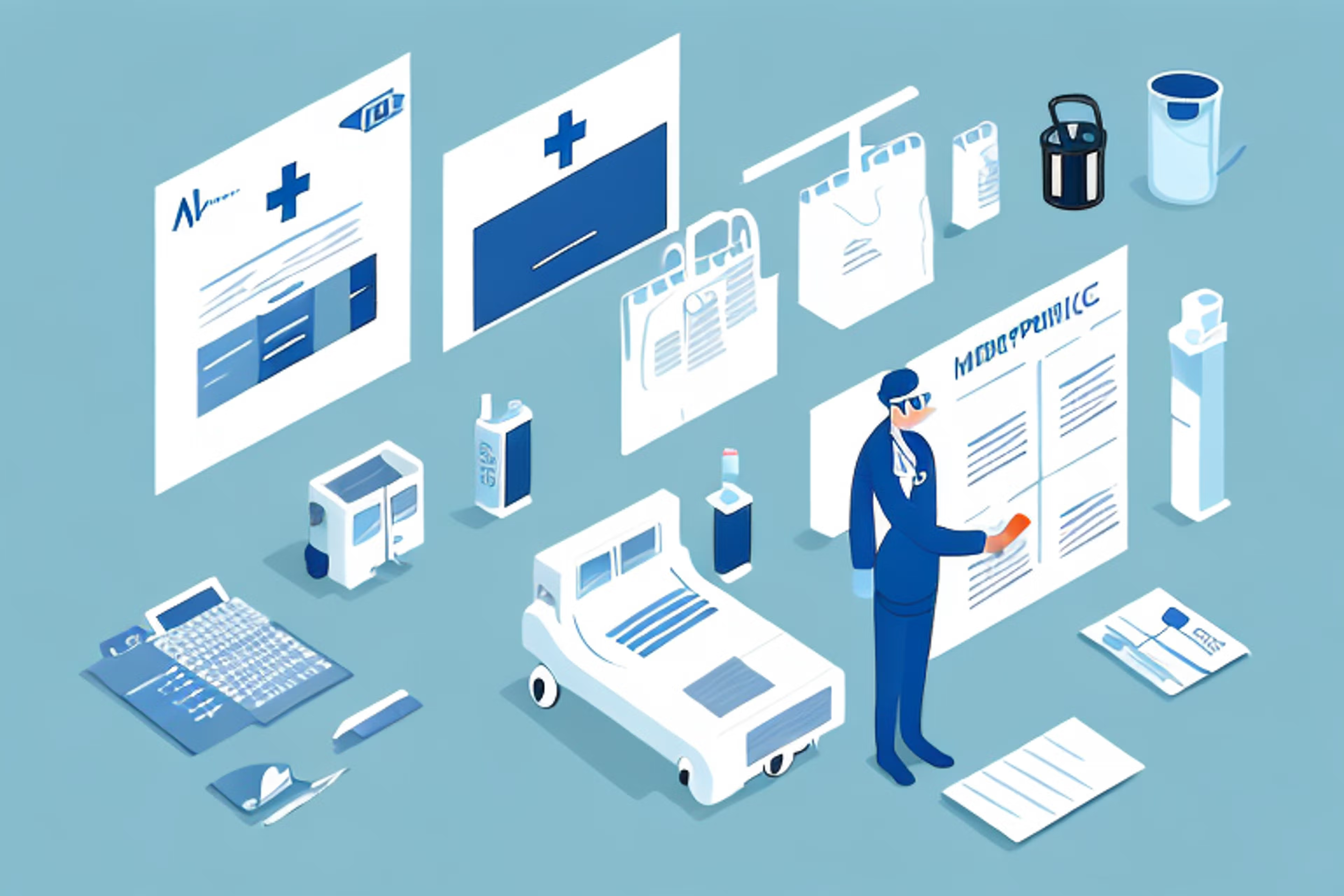Essential Skills for Healthcare Consulting: A Deep Dive
Discover the essential skills needed to excel in healthcare consulting with our in-depth guide.
Posted April 3, 2025

Table of Contents
Healthcare consulting is a booming business, and for good reason. The healthcare industry is complex, constantly evolving, and heavily regulated. Navigating the industry requires a specific set of skills that not everyone possesses, which is where healthcare consultants come in. These professionals provide various services to hospitals, clinics, private practices, and other healthcare organizations. While the specific services offered by a healthcare consultant will vary depending on the client's needs and their area of expertise, there are several essential skills that are crucial for success. In this article, we will dive deep into the essential skills needed for healthcare consulting and provide insights into how to develop these skills for success in this exciting industry.
The Importance of Healthcare Consulting
Before we delve into the specific skills needed for healthcare consulting, let's talk about why healthcare consulting is essential. There are a myriad of reasons why healthcare organizations may hire a consultant, from navigating complicated regulations to improving patient outcomes to streamlining processes to reduce costs. Whatever the reason, healthcare consultants can provide valuable insights and expertise to help organizations achieve their goals. By collaborating with healthcare consultants, healthcare organizations can gain new perspectives and make informed decisions that ultimately benefit their patients, staff, and bottom line.
One of the key benefits of healthcare consulting is the ability to stay up-to-date with the latest industry trends and best practices. With the healthcare landscape constantly evolving, it can be challenging for organizations to keep pace with new technologies, regulations, and treatment options. Healthcare consultants can provide valuable guidance on emerging trends and help organizations stay ahead of the curve. By leveraging the expertise of healthcare consultants, organizations can ensure that they are providing the highest quality care to their patients and remaining competitive in the marketplace.
Understanding the Healthcare Industry and Its Unique Challenges
One of the first skills needed for healthcare consulting is a deep understanding of the industry and its unique challenges. Healthcare is heavily regulated, and staying on top of changing regulations and compliance requirements is crucial. In addition, healthcare organizations face a variety of challenges, such as high costs, staffing shortages, and a rapidly aging population. Healthcare consultants must be able to navigate these challenges and provide practical solutions to improve outcomes and optimize processes.
Another challenge that healthcare organizations face is the increasing demand for quality care. Patients are becoming more informed and expect higher levels of care, which puts pressure on healthcare providers to deliver exceptional service. Healthcare consultants can help organizations meet these demands by implementing quality improvement initiatives and enhancing patient experience.
Furthermore, healthcare is a constantly evolving industry, with new technologies and treatments emerging all the time. Healthcare consultants must stay up-to-date with the latest advancements and be able to advise organizations on how to incorporate them into their operations. This requires a deep understanding of the industry and the ability to analyze data and trends to identify opportunities for improvement.
Communication Skills for Successful Healthcare Consulting
Effective communication is another critical skill for healthcare consultants. They must be able to communicate complex ideas and recommendations to a variety of stakeholders, from executives to front-line staff. Clear, concise communication is essential for building trust with clients and ensuring that everyone is on the same page. Healthcare consultants must also be adept at listening and understanding the needs and concerns of their clients.
In addition to verbal communication, healthcare consultants must also be skilled in written communication. They may need to write reports, proposals, and other documents that clearly convey their findings and recommendations. These documents must be well-organized, easy to understand, and free of errors. Healthcare consultants must also be able to adapt their writing style to different audiences, such as executives, clinicians, and patients.
Analytical Skills and Data Interpretation in Healthcare Consulting
Healthcare consultants must be able to analyze data and draw meaningful insights to inform their recommendations. This requires excellent analytical skills and the ability to interpret complex data sets. Healthcare consultants must also be able to communicate their findings in a way that is easily understood by their clients and stakeholders. Data analysis is often used to identify areas for improvement in patient care, reduce costs, and optimize processes.
Furthermore, healthcare consultants must stay up-to-date with the latest advancements in data analysis tools and techniques. This includes knowledge of statistical software, machine learning algorithms, and data visualization tools. By staying current with these technologies, healthcare consultants can provide more accurate and efficient recommendations to their clients.
Another important aspect of data interpretation in healthcare consulting is the ability to identify trends and patterns in large data sets. This requires a keen eye for detail and the ability to spot outliers and anomalies. By identifying these patterns, healthcare consultants can provide insights that may not be immediately apparent to their clients, leading to more effective decision-making and improved patient outcomes.
Project Management and Planning Techniques in Healthcare Consulting
Another key skill for healthcare consultants is project management and planning. Many consulting projects involve complex, multi-faceted initiatives that require careful planning and execution. Healthcare consultants must be able to manage timelines, resources, and budgets to ensure that projects are completed on time and within budget. This requires excellent organizational skills, attention to detail, and the ability to collaborate effectively with teams.
Moreover, healthcare consultants must also be able to adapt to changes in project scope or timelines. This means being able to identify potential risks and develop contingency plans to mitigate them. Additionally, consultants must be able to communicate project progress and updates to stakeholders, including clients and internal teams. Effective communication is key to ensuring that everyone involved in the project is on the same page and that the project stays on track.
Ethical Considerations in Healthcare Consulting
Healthcare consulting is a highly regulated industry with strict ethical standards. Healthcare consultants must adhere to these standards and ensure that their recommendations are in the best interests of their clients and their clients' patients. This requires a strong understanding of ethical principles, as well as the ability to make difficult decisions when faced with conflicting priorities.
One of the key ethical considerations in healthcare consulting is maintaining patient confidentiality. Healthcare consultants often have access to sensitive patient information, and it is their responsibility to ensure that this information is kept confidential and only used for the purposes for which it was obtained. This requires strict adherence to privacy laws and regulations, as well as clear communication with clients about the importance of protecting patient privacy.
Building Rapport with Clients and Other Professionals in the Industry
Building strong relationships with clients and other professionals in the healthcare industry is another key skill for healthcare consultants. Consultants must be able to connect with clients on a personal level and build trust through effective communication and collaboration. In addition, healthcare consultants must be able to work effectively with other professionals in the industry, such as physicians, nurses, and administrators, to achieve their clients' goals.
One way healthcare consultants can build rapport with clients and other professionals is by staying up-to-date with the latest industry trends and developments. By staying informed, consultants can offer valuable insights and recommendations to their clients, and demonstrate their expertise to other professionals in the industry. Additionally, attending industry conferences and networking events can provide opportunities for healthcare consultants to meet and connect with potential clients and collaborators.
Innovation and Problem-Solving Techniques in Healthcare Consulting
Healthcare is an industry that is constantly evolving, and healthcare consultants must be able to innovate and adapt to stay ahead of the curve. This requires creative problem-solving techniques and the ability to think outside the box. Healthcare consultants must be able to identify new opportunities for improvement and develop innovative solutions to complex problems.
One example of innovation in healthcare consulting is the use of technology to improve patient care. Healthcare consultants can work with hospitals and clinics to implement electronic health records (EHRs) and telemedicine solutions, which can improve communication between healthcare providers and patients, reduce errors, and increase efficiency. Additionally, healthcare consultants can help healthcare organizations leverage data analytics to identify trends and patterns in patient outcomes, which can inform decision-making and lead to better patient care.
Time Management Strategies for Healthcare Consultants
Healthcare consultants often work on multiple projects simultaneously, which requires excellent time management skills. Consultants must be able to prioritize tasks, allocate resources effectively, and manage competing deadlines. This requires strong organizational skills and the ability to stay focused when juggling multiple priorities.
One effective time management strategy for healthcare consultants is to use a project management tool to keep track of tasks and deadlines. This can help consultants stay organized and ensure that they are meeting all project requirements. Additionally, consultants can use time tracking software to monitor how much time they are spending on each project, which can help them identify areas where they can improve their efficiency.
Another important aspect of time management for healthcare consultants is the ability to delegate tasks to other team members. Delegation can help consultants free up time to focus on more critical tasks, while also providing opportunities for team members to develop new skills and take on more responsibility. Effective delegation requires clear communication and trust between team members, as well as a willingness to let go of control and allow others to take on important tasks.
Navigating Regulatory Compliance for Effective Consultancy Results
Healthcare consulting is subject to a wide range of regulations and compliance requirements. Consultants must be intimately familiar with the regulatory landscape and ensure that their recommendations are in compliance with all relevant requirements. Failing to meet regulatory requirements can lead to serious consequences for healthcare organizations, so it is essential that consultants stay up-to-date on the latest regulations and compliance requirements.
Case Studies: Real-World Examples of Successful Healthcare Consulting Projects
Case studies provide valuable insights into healthcare consulting projects and demonstrate the impact that consultants can have on healthcare organizations. Healthcare consultants may offer services such as process improvement, revenue cycle management, and IT implementation, among others. Case studies can help potential clients understand the types of services that consultants can offer and the results that can be achieved.
Networking Opportunities for Healthcare Consultants: How to Build Your Client Base
Building a successful healthcare consulting business requires effective networking and marketing. Healthcare consultants must be able to connect with potential clients and articulate the value that they can provide. This requires building relationships with industry professionals and developing a strong online presence through social media and other channels.
Future Trends and Opportunities for Healthcare Consultants
The healthcare industry is constantly evolving, and there are many exciting opportunities on the horizon for healthcare consultants. These opportunities may include areas such as telemedicine, digital health, and value-based care. Healthcare consultants must stay up-to-date on industry trends and be able to adapt to changing market conditions.
Conclusion
Healthcare consulting is a challenging and rewarding career path that requires a specific set of skills and expertise. This article has provided a deep dive into the essential skills needed for healthcare consulting and provided insights into how to develop these skills for success in this exciting industry. By developing strong analytical, communication, project management, and networking skills, healthcare consultants can help healthcare organizations achieve their goals and improve patient outcomes.


















